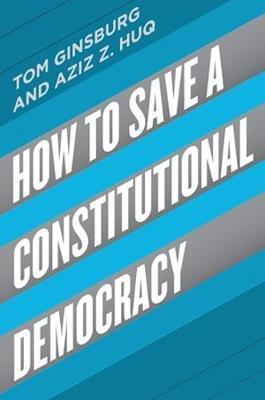How to Save a Constitutional Democracy

How to Save a Constitutional Democracy
How to Save a Constitutional Democracy mounts an urgent argument that we can no longer afford to be complacent. Drawing on a rich array of other countries' experiences with democratic backsliding, Tom Ginsburg and Aziz Z. Huq show how constitutional rules can either hinder or hasten the decline of democratic institutions. The checks and balances of the federal government, a robust civil society and media, and individual rights-such as those enshrined in the First Amendment-do not necessarily succeed as bulwarks against democratic decline. Rather, Ginsburg and Huq contend, the sobering reality for the United States is that, to a much greater extent than is commonly realized, the Constitution's design makes democratic erosion more, not less, likely. Its structural rigidity has had the unforeseen consequence of empowering the Supreme Court to fill in some details-often with doctrines that ultimately facilitate rather than inhibit the infringement of rights. Even the bright spots in the Constitution-the First Amendment, for example-may have perverse consequences in the hands of a deft communicator, who can degrade the public sphere by wielding hateful language that would be banned in many other democracies. But we-and the rest of the world-can do better. The authors conclude by laying out practical steps for how laws and constitutional design can play a more positive role in managing the risk of democratic decline.
PRP: 212.50 Lei
Acesta este Pretul Recomandat de Producator. Pretul de vanzare al produsului este afisat mai jos.
170.00Lei
170.00Lei
212.50 LeiIndisponibil
Descrierea produsului
How to Save a Constitutional Democracy mounts an urgent argument that we can no longer afford to be complacent. Drawing on a rich array of other countries' experiences with democratic backsliding, Tom Ginsburg and Aziz Z. Huq show how constitutional rules can either hinder or hasten the decline of democratic institutions. The checks and balances of the federal government, a robust civil society and media, and individual rights-such as those enshrined in the First Amendment-do not necessarily succeed as bulwarks against democratic decline. Rather, Ginsburg and Huq contend, the sobering reality for the United States is that, to a much greater extent than is commonly realized, the Constitution's design makes democratic erosion more, not less, likely. Its structural rigidity has had the unforeseen consequence of empowering the Supreme Court to fill in some details-often with doctrines that ultimately facilitate rather than inhibit the infringement of rights. Even the bright spots in the Constitution-the First Amendment, for example-may have perverse consequences in the hands of a deft communicator, who can degrade the public sphere by wielding hateful language that would be banned in many other democracies. But we-and the rest of the world-can do better. The authors conclude by laying out practical steps for how laws and constitutional design can play a more positive role in managing the risk of democratic decline.
Detaliile produsului








